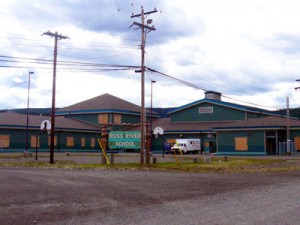Ross River Dena, Yukon

Year(s) Funded: 2009-2010
Topic Area: Food Security Contact: Norman Sterriah ([email protected]) Partners: Northern Contaminants Program, Dena Kayeh Institute, Canadian Boreal Initiative Title: Caribou, Culture & Climate Change
Action: The Ross River Dena Council has successfully taken the first step in building adaptive capacity by understanding how traditional hunters determine the health and vitality of the caribou populations they are hunting. Traditional Knowledge was a central part in the study, as Ross River Elders were encouraged to have their say and share their views as to their observations gathered in the study. Harvested caribou were tested for contaminants as was done previously in the 90’s. Not only were the kidneys tested but also muscle tissue and body weight information was gathered. The science was to be compared with other studies throughout the Arctic circumpolar region of the world. •Build on existing Traditional Knowledge project to broaden understanding of traditional use and more specifically caribou. •Consider adaptive strategies as it pertains to climate change and changes in quality and availability of local foods, and consequently human health. •To build on the capacity of the Ross River Dena people to assess information with respect to human health. •Develop an understanding of current and historic patterns of abundance, distribution and movement patterns of the Tay River heard; Traditional Dena movement patterns in relation to the Tay river herd; Traditional assessment of caribou health and abundance and how Dena adapted to changes. Results: It was learned that there were vast numbers of caribou in the Ross River area and times that there were little – the conclusion was that there was a cycle of abundance and scarcity. There was also a management system when the number appears to decline by hunting other species or elsewhere where the numbers are better. Traditional land stewardship is guided by traditional laws that were handed down through the many generations of Kaska ancestry. Predator control was also observed when populations of wolves increased. The change now being experienced has never been observed prior to present day events, and it is having a broad effect not only on caribou. Much earlier spring thaw-freeze has taken its toll on caribou calves, and created difficulties in caribou getting to their food through the snow crust that forms over them. It was also noticed that the summer months are a lot warmer which makes it difficult for the caribou as they go higher into the mountains to seek out snow patches and to get away from many insects on windy ridges. Wildfires are also a huge concern as they destroy core winter habitats and the lichen the caribou depend on for food and causes travel disruptions if the fires go through travel corridors. Over Harvesting has also been highlighted as more hunters are beginning to come as other caribou populations are dwindling elsewhere. Contaminants are also being identified as a concern as scientist conducted studies in the 90’s and identified cadmium levels, which have increased in caribou in the Tay herd. A 2011 follow-up study has shown the levels have remained as previous results. Many of the Ross River Elders believe this may be the result of the Faro Mine project, which is located 60 km downstream from Ross River. The local concern takes on more emphasis as more mineral interests are being discovered in the region. Management Planning is most favorable to Ross River Elders where traditional knowledge and science can be equally applied to establish a management plan. Outputs: The caribou study gathered information from Ross River Dena traditional knowledge holders and scientists and produced a 40-minute DVD video. |
